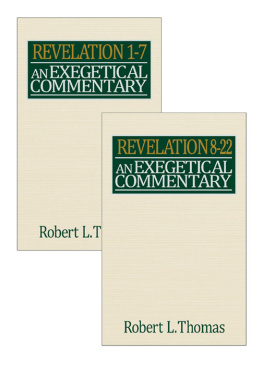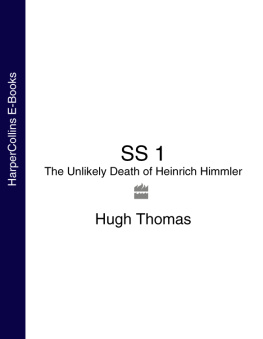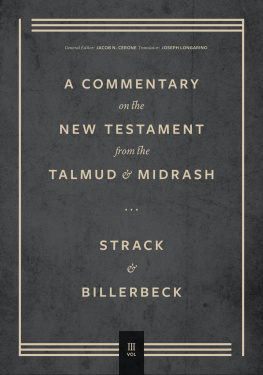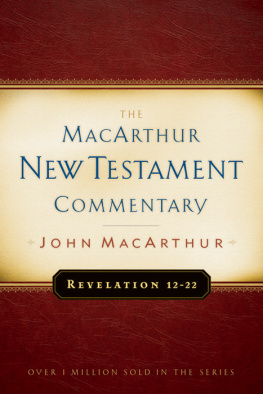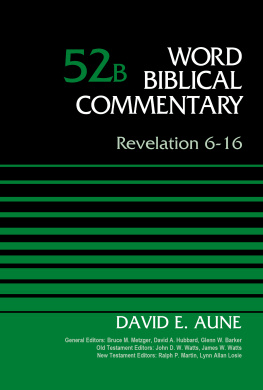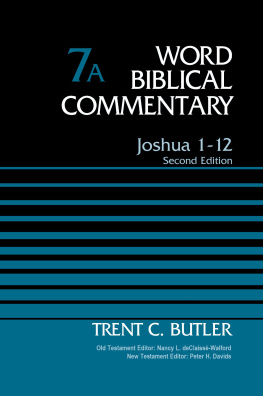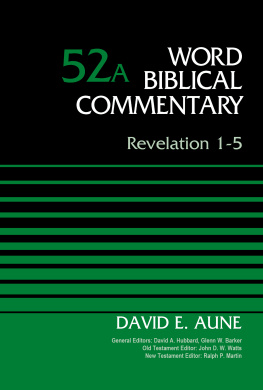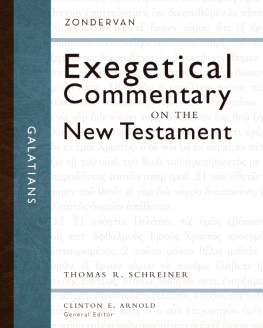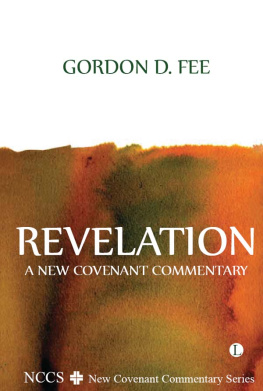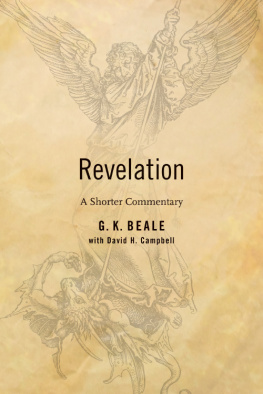Contents of Set
1992 by
ROBERT L. THOMAS
All rights reserved. No part of this book may be reproduced in any form without permission in writing from the publisher, except in the case of brief quotations embodied in critical articles or reviews.
All Scripture quotations, unless otherwise noted, are the authors translation.
Library of Congress Cataloging in Publication Data
Thomas, Robert L., 1928
Revelation 1-7 / Robert L. Thomas.
p. cm.
Includes bibliographical references and indexes.
ISBN-10: 0-8024-9265-7
ISBN-13: 978-0-8024-9265-4
1. Bible. N.T. Revelation I-VIICommentaries. I. Title. II. Series.
BS2825.3.T46 1992
228.07dc20 91-45740
CIP
We hope you enjoy this book from Moody Publishers. Our goal is to provide high-quality, thought-provoking books and products that connect truth to your real needs and challenges. For more information on other books and products written and produced from a biblical perspective, go to www.moodypublishers.com or write to:
Moody Publishers
820 N. LaSalle Boulevard
Chicago, IL 60610
Dedicated to my children,
Barbara
Bob
Jon
Mark
Mike,
five overcomers whose faith in Christ has been a great encouragement
Written especially for the informed layman, student, and scholar, all exegesis and exposition is based on the original languages of the Bible books. Translations used are those of the author. Textual criticism and word study are included where appropriate.
This in-depth commentary also includes extended excursuses on important topics of theological, historical, and archaeological interest.
The text is interpreted according to a historical, critical, grammatical hermeneutic and propounds a conservative, evangelical theology. But the reader will not get a narrow view of problem passages. This commentary interacts with a range of major views, both evangelical and nonevangelical.
General Editor
Kenneth L. Barker (B.A., Northwestern College; Th.M., Dallas Theological Seminary; Ph.D., Dropsie College for Hebrew and Cognate Learning) is executive director of the NIV Translation Center (a ministry of the International Bible Society) in Lewisville, Texas, and former academic dean and professor of Old Testament literature and exegesis at Capital Bible Seminary, Lanham, Maryland.
Special Editor
Moiss Silva (B.A., Bob Jones University; Ph.D., University of Manchester, England; B.D., Th.M., Westminster Theological Seminary) is chairman of the New Testament department and professor of New Testament at Westminster Theological Seminary, Philadelphia.
REVELATION
Through the centuries since its writing, the book of Revelation has captured the fascination of the Christian church. Earliest Christians were unanimous in understanding its prophecies as descriptions of events surrounding the premillennial second advent of Jesus Christ, but alongside their exclusively futuristic and premillennial view other hermeneutical approaches to the book began to emerge in the third century. These clouded, and added complexity to, the task of explaining the books meaning. For most of the Christian era, consequently, many readers have viewed this last of the NT writings as though it were hopelessly embedded in an aura of deep mystery. An avalanche of interpretive literature has evidenced remarkable interest in the books contents, but along with the interest has come widespread bewilderment.
In post-Reformation times detailed commentaries on the Greek text of Revelation from a futurist and premillennial perspective have been scarce and perhaps even nonexistent. This first of two volumes commences the filling of that void with its exegetical analysis of the first seven chapters of the Apocalypse. It reaffirms the basic framework of eschatology espoused by ancient Christianity, but with added help from centuries of maturing thought and doctrinal progress in the Body of Christ.
About the author
Robert L. Thomas (B.M.E., Georgia Institute of Technology; Th.M., Th.D., Dallas Theological Seminary) is professor of New Testament language and literature at The Masters Seminary, Sun Valley, California. He has written Understanding Spiritual Gifts and 1, 2 Thessalonians in the Expositors Bible Commentary and has edited A Harmony of the Gospels (NASB) and The NIV Harmony of the Gospels. He is also general editor of the New American Standard Exhaustive Concordance.
Table of Contents
Revelation 8-22, the second volume of this commentary, contains four indexes, each of which covers both volumes. These deal with .
While the various areas of biblical criticism receive at least brief treatment in this volume, the principal emphasis of the commentary is exegesis. By exegesis we mean the application of generally accepted hermeneutical principles to the original (Hebrew, Aramaic, and Greek) biblical text with a view to unfolding (lit. leading out, Gk. exgeomai) its correct, contextual meaning. The method followed is commonly referred to as grammatico-historical exegesis. A more complete designation would be the grammatical-historical-literary-theological method.
This is a commentary on the Greek and Hebrew texts of the Bible, not on an English translation. Consequently Greek and Hebrew words and phrases appear in their original scripts, but with English transliterations and translations provided at their first occurrence. After that, transliterations alone normally suffice. However, only the original scripts are employed in the Additional Notes and footnote discussions, since scholars and specialists would be the ones most interested in that more technical material (e.g., word studies, grammatical or syntactical points, etymologies, textual variants in the original languages, specialized bibliographies, etc.). Unless otherwise indicated, all Scripture translations are those of the authors of the individual volumes.
This commentary stresses the development of the argument of a given book and its central theme(s). An attempt has been made to show how each section of a book fits together with the preceding and following sections. We do not want the reader to become so preoccupied with the trees (analysis) that he fails to see the forest (synthesis).
Most of the abbreviations and transliterations follow the guidelines of the Journal of Biblical Literature (JBL). The only abbreviations listed are those not found in JBL.
Asterisks in either the Translation or the Exegesis and Exposition section refer the reader to discussions of text-critical problems in the Additional Notes section, though these are not the only kinds of discussions one will encounter in the Additional Notes sections (see above).
I trust and pray that this commentary will be used by God to advance the cause of a more exegetically-based, and so more accurate, biblical interpretation and biblical theology. Pauls parting words to the Ephesian elders seem apropos here: Now I commit you to God and to the word of his grace, which can build you up and give you an inheritance among all those who are sanctified (Acts 20:32, NIV).
KENNETH L. BARKER
General Editor
This commentary on Revelation results from a pilgrimage of over thirty years. It started with a doctoral dissertation tracing the books logical development, The Argument of the Book of Revelation, under the mentorship of S. Lewis Johnson at Dallas Seminary in the late 1950s. It has continued through a continuous ministry of teaching and specialized research ever since. It is satisfying now to be able to make available some of those results.

